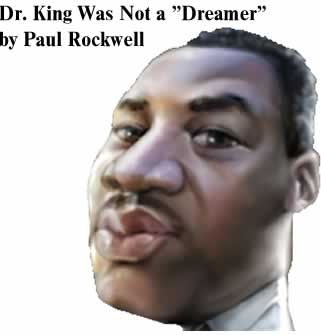This article originally appeared in In Motion
Magazine.
Every year, millions of Americans pay tribute to the memory of Dr.
Martin Luther King. We often forget, however, that King was the object
of derision when he was alive. At key moments in his quest for civil
rights and world peace, the corporate media treated King with hostility.
Dr. King's march for open housing in Chicago, when the civil rights
movement entered the North, caused a negative, you've-gone-too-far
reaction in the Northern press. And Dr. King's stand on peace and international
law, especially his support for the self-determination of third world
peoples, caused an outcry and backlash in the predominantly white press.
In his prophetic anti-war speech at Riverside Church in 1967 (recorded and
filmed for posterity but rarely quoted in today's press) King emphasized
four points: 1) that American militarism would destroy the war on poverty,
2) that American jingoism breeds violence, despair, and contempt for law
within the United States, 3) the use of people of color to fight against
people of color abroad is a "cruel manipulation of the poor," 4)
human rights should be measured by one yardstick everywhere.
The Washington Post denounced King's anti-war position, and said
King was "irresponsible." In an editorial entitled "Dr.
King's error," The New York Times chastised King for going
beyond the allotted domain of black leaders -- civil rights. TIME called
King's anti-war stand "demogogic slander...a script for Radio Hanoi." The
media responses to Dr. King's calls for peace were so venomous that King's
two recent biographers – Stephen Oates and David Garrow – devoted whole
chapters to the media blitz against King's internationalism.
Dr. King may be an icon within the media today, but there is still something
upsetting about the way his birthday is observed. Four words – "I have
a dream" – are often parroted out of context every January 15th.
King, however, was not a dreamer – at least not the teary-eyed, mystic projected
in the media. True, he was a visionary, but he specialized in applied ethics.
He even called himself "a drum major for justice," and his mission,
as he described it, was, "to disturb the comfortable and comfort the
disturbed." In fact, the oft-quoted "I have a dream" speech
was not about far-off visions. In his speech in Washington, D.C., August
28, 1963, Dr. King confronted the poverty, injustice, and "nightmare
conditions" of American cities. In its totality, the "I have a
dream" speech was about the right of oppressed and poor Americans to
cash their promissory note in our time. It was a call to action.
Click to view digital
painting of Dr. King by  cartoonist, 29.
cartoonist, 29.
In 1986, Jesse Jackson wrote an essay on how Americans can protect
the legacy of Dr. King. Jackson's essay on the trivialization, distortion,
the emasculation
of King's memory, is one of the clearest, most relevant appreciations in
print of Dr. King's work. Jackson wrote: "We must resist the media's
weak and anemic memory of a great man. To think of Dr. King only as a dreamer
is to do injustice to his memory and to the dream itself. Why is it that
so many politicians today want to emphasize that King was a dreamer? Is it
because they want us to believe that his dreams have become reality, and
that therefore, we should celebrate rather than continue to fight? There
is a struggle today to preserve the substance and the integrity of Dr. King's
legacy."
Today, the media often ignores the range and breadth of King's teachings.
His speeches – on economlc justice, on our potential to end poverty, on the
power of organized mass action, his criticism of the hostile media, his opposition
to U.S. imperialism (a word he dared to use) – are rarely quoted, much less
discussed with understanding. In fact, successors to Dr. King who raise the
same concerns today are again treated with sneers, and their "ulterior
motives" are questioned. A genuine appreciation of Dr. King requires
respect for the totality of his work and an ongoing commitment to struggle
for peace and justice today.
Paul Rockwell, formerly assistant professor of philsophy at Midwestern
University, is a writer who lives in Oakland, California.



